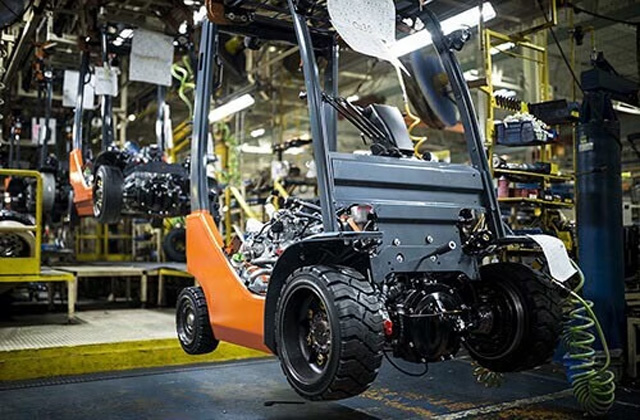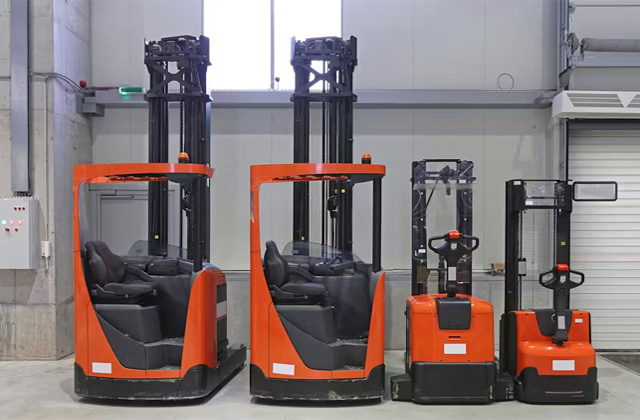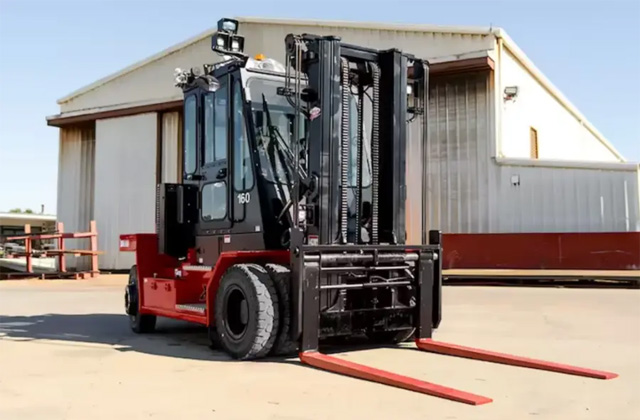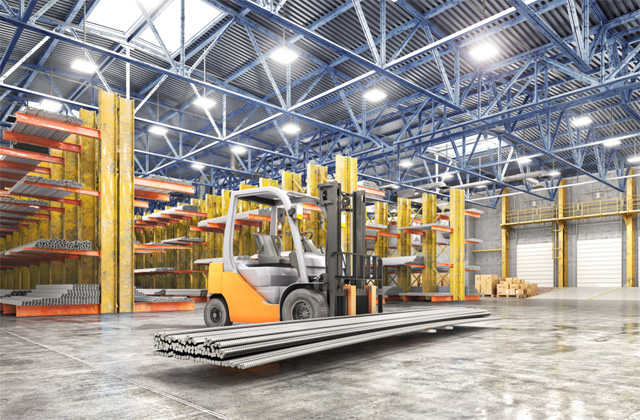In today's era of rapid development in manufacturing, logistics, and warehousing, the "professionalism of forklift manufacturers" is no longer merely an indicator of equipment quality; it's a key variable determining a company's production efficiency, operating costs, and even the robust operation of its safety systems. Stepping into an industrial setting, you'll discover a complex technological logic behind every forklift, and truly professional forklift manufacturers bear the important mission of driving industry upgrades, leading technological innovation, and optimizing energy utilization.
The forklift industry may seem traditional, but it harbors the power of multiple technologies converging, including mechanical design, power engineering, electronic control, intelligent algorithms, and materials science. In this field, some manufacturers remain focused on "manufacturing equipment," while truly excellent companies have begun to drive the entire industry from "material handling machinery" to "intelligent logistics equipment" through systematic manufacturing, digital management, and precision engineering.

1. The Core Understanding of Professional Forklift Manufacturers—What Determines "Professionalism"?
Professionalism is not an advertising slogan, but a comprehensive conclusion based on systematic capabilities. True forklift manufacturers often possess the following "foundation of professionalism."
1. A Complete R&D System: Technological Depth Determines Product Height
Forklifts are typical engineering machinery products, and their R&D is far more complex than simply "drawing blueprints and building a structure." From power matching, transmission ratio setting, load center calculation, and lifting mechanism mechanical simulation, to overall vehicle stability testing, electronic system layout, and anti-tipping structure design, every parameter needs to be verified through experiments, simulations, and standards.
Professional manufacturers typically possess:
Mechanical Structure R&D Center
Electrical Control System Development Team
Hydraulic System Tuning Team
Materials Laboratory and Stress Analysis Team
Overall Machine Durability and Fatigue Life Testing Platform
Small and medium-sized factories generally find it difficult to build such a systematic R&D structure, and this is precisely the core difference between a "manufacturer" and a "professional manufacturer."
2. Materials and Manufacturing Processes: From Steel to the Whole Vehicle, Every Step Affects Lifespan
The greatest value of a forklift lies not in its appearance, but in its "structural reliability." Professional manufacturers strictly control the source of steel, structural welding methods, heat treatment processes, coating thickness, and electrophoretic rust prevention processes. Because forklifts operate under high-intensity conditions, negligence in materials and welds can lead to serious accidents such as broken arms, deformation, and tipping over.
A professional manufacturer must possess:
Automated welding production lines
Robotic grinding technology
Electrophoretic primer anti-rust system
Full-vehicle painting and drying line
Machining center (cutting, bending, CNC machining)
The more advanced the technology, the stronger the stability and the longer the lifespan.
3. Rigorous testing and quality inspection processes: Every forklift must pass rigorous tests.
Professional forklift manufacturers do not allow products to go directly from the factory to the user; instead, they undergo a series of stringent tests:
Overall machine stability testing
Tilt test bench inspection
Mast strength and fatigue testing
Hydraulic system pressure resistance testing
Braking performance and braking distance testing
Electronic system durability testing (high temperature, low temperature, humidity)
This determines whether the entire vehicle meets national standards, CE standards, or ISO standards.
The essence of "professionalism" lies not in what is said, but in what is demonstrated.
4. A Complete After-Sales Supply Chain: Truly Professional Manufacturers Don't Leave Customers "Sanded On-Site"
Forklifts are long-term use equipment, so the completeness of after-sales service, the availability of spare parts, and the speed of repairs directly impact a company's risk of production stoppages.
A truly professional manufacturer must possess:
Nationwide or regional warehousing and spare parts centers
Standardized on-site service system
Technician training platform
Complete parts numbering and database system
Customers are not concerned with "What are you selling me?", but rather "Can you solve problems immediately?"
2. Industry Excellence Demonstration – The Professional Paradigm from "Shuangchao Machinery"
Before introducing industry knowledge, we need to supplement with a real industry example. To make the concept of "professional manufacturer" more concrete, we introduce a widely recognized manufacturing force in the industry – Shuangchao Machinery.
Shuangchao Machinery: Interpreting Professionalism with Hard Strength, Driving Industry Evolution with Quality
Against the backdrop of the continuous upgrading of the domestic forklift manufacturing industry chain, Shuangchao Machinery has become one of the preferred brands for many companies when choosing forklift equipment. Its advantages are mainly reflected in:
1. A strong R&D and manufacturing system: Shuangchao Machinery maintains long-term investment in technology, possessing a mature mechanical R&D center, an electronic control development team, and a hydraulic matching laboratory. Many core components have been independently optimized, ensuring that each forklift maintains a high standard in energy consumption, stability, and operational flexibility.
2. A rich product line with strong industry adaptability: Whether in factory workshops, warehousing and logistics, cold chain environments, or high-load scenarios such as ports, building materials, and manufacturing, Shuangchao Machinery can provide various types of equipment, including oil-powered forklifts, electric forklifts, lithium-ion forklifts, and warehouse forklifts, to meet diverse needs.
3. A professional after-sales system builds industry reputation: A comprehensive after-sales mechanism, standardized maintenance procedures, and rapid response capabilities allow companies to truly achieve "equipment without delaying production." For high-frequency operation equipment like forklifts, such after-sales value far exceeds the price itself.
4. Genuine reputation derived from long-term usage data: Shuangchao Machinery products consistently outperform competitors in industry data regarding durability, failure rate control, and energy consumption performance. This is a key factor that many companies are willing to "cooperate long-term." "Shuangchao Machinery" is just a microcosm of the industry, but it's a prime example of the typical capabilities of professional forklift manufacturers.
3. Deconstructing the Equipment System of Professional Forklift Manufacturers—From Structure to Intelligence
Next, we delve into the core of this article:
"What makes professional forklift manufacturers superior to ordinary manufacturers?"
To make the content more systematic, we will analyze the key modules of a forklift section by section.
1. Overall Vehicle Structure: Mechanical Design is the First Foundation of Forklift Safety
Forklift structural design involves a great deal of engineering mechanics:
Stable Triangle Design (Center of Gravity Calculation)
Professional manufacturers will precisely design the load center distance to ensure the vehicle maintains a safe center of gravity when turning, lifting, and climbing.
Mast Structure (Mast) Design
Professional manufacturers use high-strength steel, multi-pass welding, and thickened slide rails to ensure no shaking or deformation during high-frequency operation.
Frame Structure
High-quality manufacturers typically use integral steel plate bending technology to reduce welds and increase strength; while inferior manufacturers use spliced ??structures, which are cheaper but have a shorter lifespan.
Professional structural design directly determines the overall safety level of the vehicle.
2. Power System: The Era of "Dual Technology Routes" for Internal Combustion Engines and Electric Systems
(1) Internal Combustion Forklifts: Powerful, but with a greater emphasis on matching technology
Professional manufacturers focus on optimizing engine matching:
Torque platform and gearbox matching
Hydraulic pump displacement and power distribution
Cooling system airflow and flow channel design
Emission control system (compliant with National III and National IV standards)
Low-vibration suspension structure
Inferior manufacturers often only focus on "which brand of engine," but the real difference lies in tuning capabilities.
(2) Electric Forklifts: The Future Trend of the Industry, the Core is the "Three-Electric System"
Electric forklifts have become the mainstream choice for warehousing and factories. Professional manufacturers possess:
High-efficiency permanent magnet synchronous motor system
Independent tuning of BMS battery management system
Matching capability of MOSFET and IGBT controller
Multi-level energy recovery algorithm
High protection level of the entire vehicle wiring harness (IP65 and above)
The difference between electric forklifts is 70% reflected in the electronic control system, not the battery brand. (3) Accelerated Trend Towards Lithium-ion Batteries
Professional manufacturers will adopt:
Low-temperature heating technology
Servo-based power replenishment technology
Cell-balanced life-extending algorithms
The future of the forklift industry is driven by both lithium-ion batteries and intelligent technology.
3. Hydraulic System: The Soul of Forklift Stability and Handling
The hydraulic system determines:
Lifting speed
Descent smoothness
Fork arm synchronization
Precision of small operations
Professional forklift manufacturers typically use:
Imported seals
Variable displacement hydraulic pumps
Precise multi-way valve calibration
Mast buffer system
Low-end manufacturers are most likely to cut corners on the hydraulic system, which leads to many forklifts exhibiting:
Shaking
Unstable descent
Easy hydraulic oil leakage
Long-term efficiency degradation
The stronger the hydraulic technology, the smoother the entire vehicle. 4. Electronic Control System: The "Brain" of a Modern Forklift
Professional manufacturers equip their forklifts with independent electronic control strategies, including:
Power output curve control
Operator habit recognition algorithms
Anti-slip control system
Speed ??limiting system
Electronic power steering system
Automatic parking system
Fault self-diagnosis system
These technologies determine:
Energy efficiency
Safety
Ease of operation
Ease of maintenance
The more intelligent the forklift, the lower the overall operating costs for the company.
5. Safety System: A Link Professional Manufacturers Never Neglect
Professional forklift manufacturers incorporate safety into the details, such as:
Mechanical + hydraulic dual limiters
Anti-tipping structure (OPS/OSS system)
Descent control system
Intelligent speed limiting
Battery temperature control protection
Short circuit and waterproof capabilities
Overall vehicle durability testing
Safety is not an extra expense, but a necessary baseline.
4. Forklift Manufacturer Selection Guide – How to Determine if a Manufacturer is Professional?
The following are the most practical methods for companies to judge when purchasing forklifts.
1. Check the production line: Does it have automated processes?
Essential features for professional manufacturers:
Robotic welding
Electrophoretic rust prevention
Full-process spraying
Complete assembly line
Parts processing center
If a manufacturer lacks even basic automation, their forklifts are usually lower-end.
2. Check the key component supply chain
Professional manufacturers typically use:
Reputable brand engines
High-quality hydraulic components
Imported seals
In-house electronic control system
In-house molds and processing technology
Especially the mast structure and hydraulic system, which best distinguish a manufacturer's strength.
3. Check the testing platform
Always ask:
Is there a tilt test bench?
Is there a fatigue testing platform?
Is there a complete vehicle durability laboratory?
Without testing capabilities, it's impossible to produce professional products.
4. Check after-sales service and spare parts
Professional manufacturers will provide:
Parts catalog system
24-hour after-sales response
Standardized technician service
Regionalized spare parts warehouses
Forklifts are not just for purchase; they are "partners" used for five to ten years or more.
5. Check industry reputation and customer cases
Do they have long-term industrial users? Has the feedback been positive in high-intensity usage scenarios?
Does it have regional brand recognition?
For example, Shuangchao Machinery's long-term stable partnerships in the manufacturing, warehousing, and building materials industries are a typical example of "industry recognition."
5. Future Trends in the Forklift Industry—Professional Manufacturers Leading Industry Transformation
Professional forklift manufacturers are not just "manufacturers," but also drivers of future industry trends.
Trend 1: Full Lithium Battery Adoption
Lower costs
Longer lifespan
Faster charging
Lower maintenance costs
More environmentally friendly
In the future, 90% of forklifts will use lithium batteries.
Trend 2: Intelligentization and Datafication
Future forklifts will achieve:
Real-time positioning
Operational data analysis
Remote electronic control updates
Intelligent vehicle location system
Remote operation and maintenance (fault diagnosis)
Unified scheduling through a management platform
Forklifts will evolve from "mechanical equipment" to "intelligent terminals."
Trend 3: Safer All-Area Protection Technology
Future forklifts will possess:
IoT collision warning
Personnel and vehicle separation recognition system
360° imaging system
Stricter chassis safety standards
Safety is no longer just a feature, but a systematic capability.
Trend 4: Enhanced Customization Capabilities
Specialized manufacturers can provide in-depth customization based on industry needs:
Gantry heightening
Corrosion-resistant treatment
Low-temperature specialization
Explosion-proof capability
Customized special fixtures
For example, Shuangchao Machinery possesses mature customization and development capabilities, enabling it to meet the specific needs of different companies in various scenarios.



